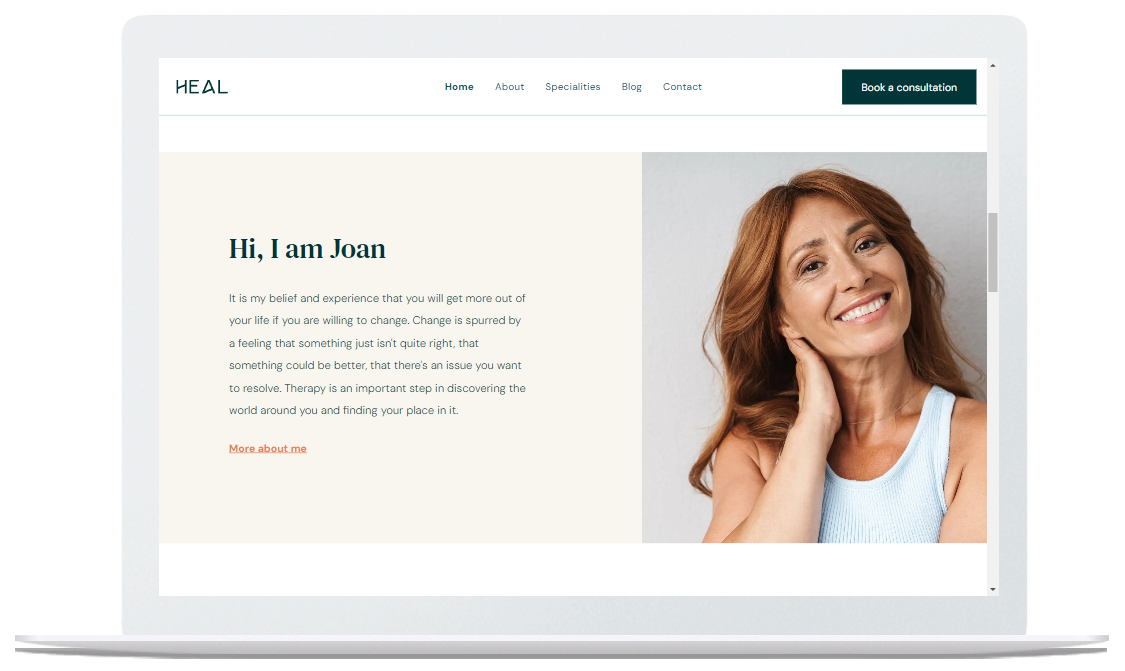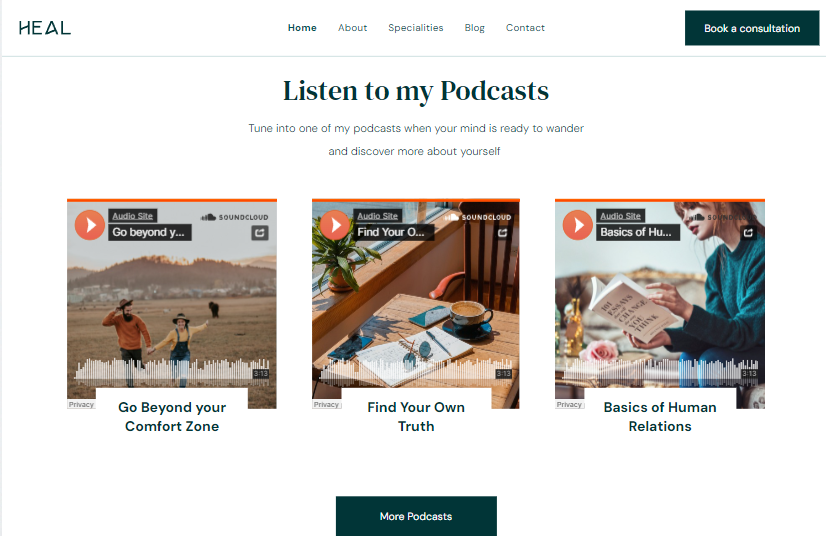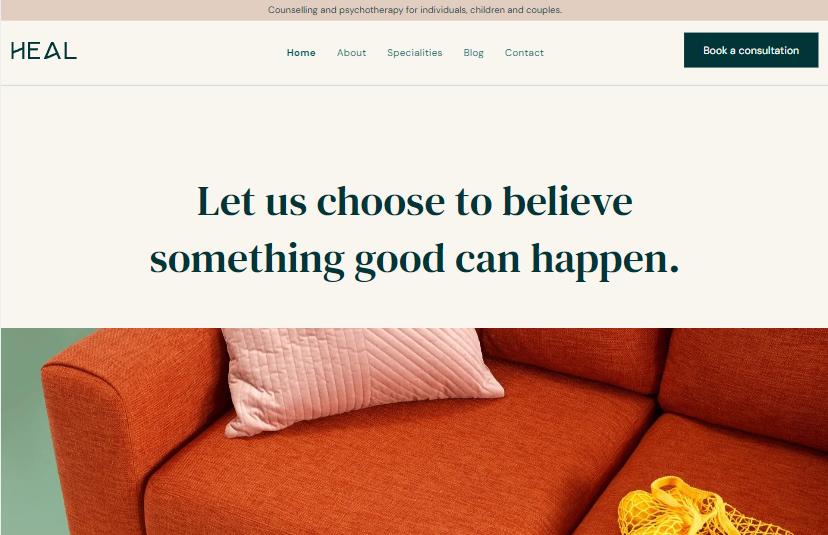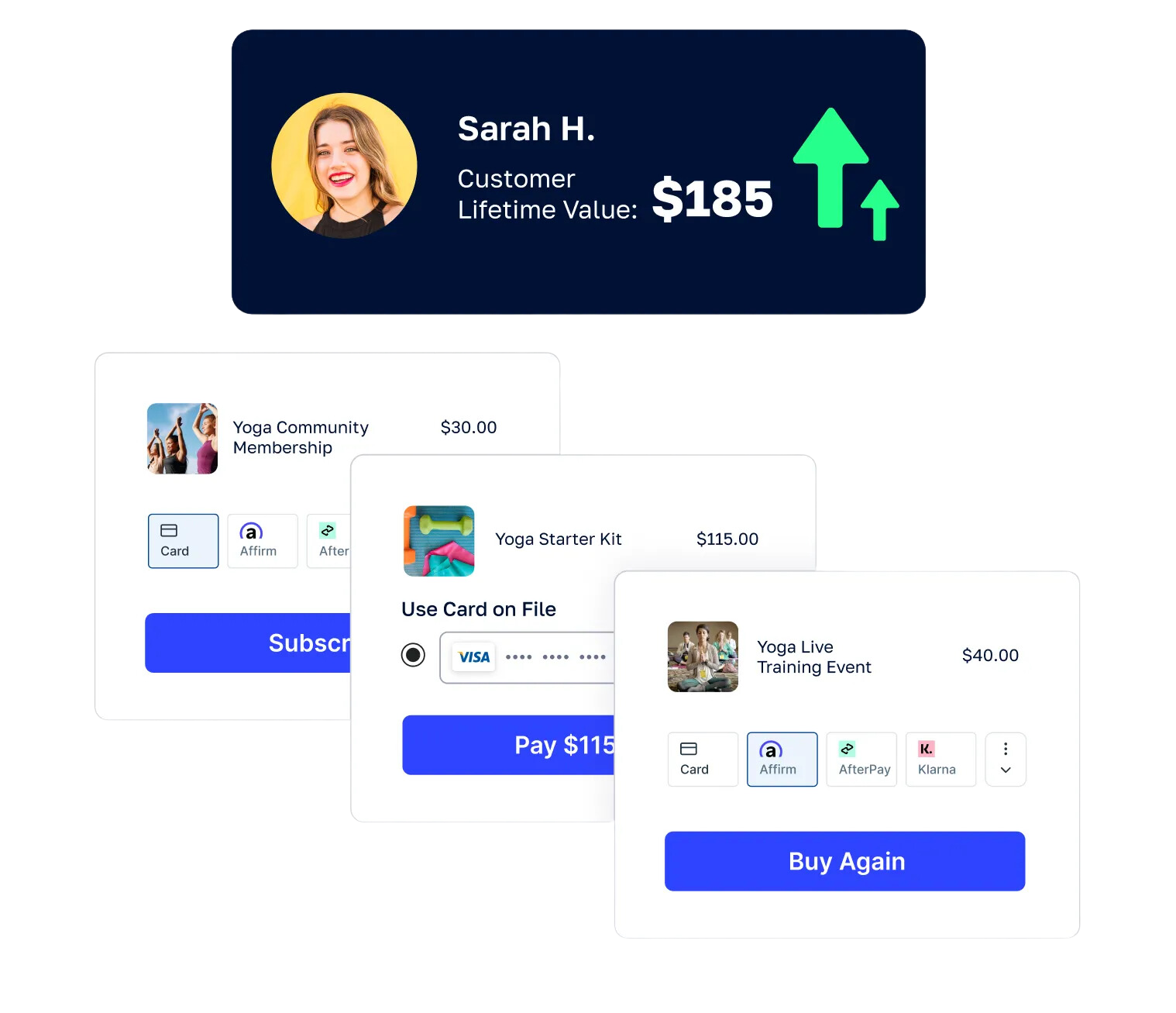AutomationLinks
This blog post has been researched, edited, and approved by expert Hannah Peake. Join our newsletter below to get our free marketing guides.
Here are four simple marketing tips for a therapist:
- Choosing the Right Therapy Niche: When selecting a therapy niche, consider focusing on specific mental health issues or age groups you're passionate about. This specialization helps in creating targeted marketing strategies and improves your ability to connect with and effectively treat your target audience.
- Creating an Attractive Therapist Website: An effective therapist website should be professional, welcoming, and easy to navigate. Include clear information about your services, your specialty areas, and how potential clients can contact you. Adding a blog with helpful resources can also enhance your online presence and attract more clients.
- SEO Tips for Therapists: To improve your website's search engine ranking, incorporate relevant keywords into your content, especially those related to your specialty and location. Regularly update your site with useful information and consider local SEO tactics, such as listing your practice on Google My Business, to target clients in your area.
- Increasing Client Referrals:
Encourage satisfied clients to share their positive experiences with others and leave reviews online. Building a network with other healthcare providers and participating in community events can also increase your visibility and lead to more referrals. Always ensure you're following ethical guidelines when using client testimonials in your marketing.
Table of contents
- Introduction
- Understanding Your Audience
- Building a Strong Online Presence
- Utilizing SEO Strategies
- Encouraging Word-of-Mouth Through Client Testimonials
- Networking and Community Involvement
- Wrapping Up
The Rising Demand for Mental Health Services
Nowadays, more people than ever are looking for help with their mental health. Recent studies have found that up to 40% of adults are now more open to seeking mental health support compared to just a few years ago. This is good news because it means people are recognizing the importance of taking care of their mental wellbeing just as much as their physical health. But here’s the catch - the number of therapists has also increased. So, how do you make sure people choose you among the many options?
The secret is good marketing. But don't worry, you don't have to become a marketing guru overnight. Marketing is really just about finding the right ways to tell people how you can help them, in a language they understand.
We've put together five straightforward and impactful marketing tips, tailor-made for therapists. By following these tips, you can reach more people who could really benefit from your services and ensure your practice stands out in a crowded field. Ready to make a difference? Let’s dive in!
Connect With Us On X
Connect with AutomationLinks owner Brad Smith on X (formerly Twitter) here to learn more about advertising. Feel free to message him with any questions about X advertising and marketing.
Understanding Your Audience
Identifying your niche in the vast field of mental health is a crucial first step towards effective marketing. Think of your niche as your specialty—the specific mental health issues or age groups you're most skilled at helping. This isn't just about narrowing down your focus; it's about becoming the go-to therapist for a particular group who needs your expertise. Whether you specialize in anxiety disorders, depression, adolescent mental health, or couples therapy, knowing your niche helps you tailor your message so it speaks directly to those who are most likely to benefit from your services.
Understanding your target audience goes beyond just knowing their problems. It's about diving deep into their demographics—age, location, gender, lifestyle—and their specific needs and preferences. This knowledge is like a compass guiding your marketing strategies, from the language you use on your website to the social media platforms you engage on. By aligning your marketing efforts with the characteristics and behaviors of your target audience, you're more likely to catch their attention and resonate with their needs.
- Conduct Surveys or Interviews: Reach out to current or past clients (while maintaining confidentiality) to understand what drew them to your services.
- Research Online Forums and Social Media: Look for patterns in discussions related to mental health within your niche to understand common concerns and language used.
- Define Your Ideal Client: Create a detailed profile of your ideal client based on your niche. Consider their age, problems they're facing, where they spend time online, and what they value in therapy.
- Keep Up with Trends: Stay informed about new developments or trends in your area of specialization. This ensures your marketing content is relevant and up-to-date.
- Ask for Feedback: Regularly seek feedback from your clients about how they found you and what made them choose your services. This can provide valuable insights into your marketing's effectiveness.
Building a Strong Online Presence
In today's digital age, having a strong online presence is no longer optional for therapists—it's essential. The cornerstone of this presence is a professional, easy-to-navigate website. Your website is often the first point of contact between you and potential clients. It's where they go to learn about who you are, what you offer, and how you can help them. A well-designed website conveys professionalism and credibility, reassuring visitors that they're in the right place. Ensure your site is welcoming, provides clear information on your services, and includes an easy way for clients to reach out or book appointments.
Beyond your website, content marketing and social media play pivotal roles in attracting and engaging potential clients. Starting a blog allows you to share valuable insights, tips, and stories that can help demystify therapy and make mental health topics more accessible. Each blog post is an opportunity to showcase your expertise, connect with readers, and improve your site's search engine rankings. Social media, on the other hand, offers a platform to share these blog posts, interact with your community, and build relationships with potential clients. By consistently providing value through these channels, you can strengthen your online presence and draw more people to your services.
- Focus on Website User Experience: Make sure your website is mobile-friendly, loads quickly, and offers a seamless booking process.
- Create Quality Content: Write blog posts that address common questions or concerns your target audience might have. Use simple, relatable language.
- Be Active on Social Media: Choose platforms where your target audience is most active. Regularly post content, engage with followers, and participate in relevant conversations.
- Use Visuals: Incorporate professional photos of yourself and your practice, along with infographics or videos, to make your content more engaging.
- Implement SEO Practices: Use relevant keywords in your website and blog content to improve your visibility in search engine results, making it easier for potential clients to find you.
- Encourage Reviews: Ask satisfied clients to leave positive reviews on your website or relevant social media platforms to enhance your credibility and attract new clients.
Utilizing SEO Strategies
Understanding the basics of Search Engine Optimization (SEO) is crucial for any therapist looking to increase their online visibility. SEO is what helps your website show up in search engine results when potential clients search for therapists or mental health services. For therapists, this means incorporating keywords and phrases into your website that your target audience is likely to use when seeking therapy services. These keywords should be relevant to your specialization and the types of therapy you offer. By optimizing your website content with these keywords, you're making it easier for search engines to understand what your site is about and how it matches the searcher's needs.
In addition to using relevant keywords throughout your website's content, titles, and meta descriptions, leveraging local SEO is particularly important for therapists. Most clients prefer therapy services located near them, so make sure your website clearly mentions your location. This includes having your practice's name, address, and phone number consistently listed not only on your site but also across any online directories. Creating a Google My Business profile can further enhance your local SEO, making it easier for clients in your area to find you. Remember, the goal of SEO is not just to increase website traffic, but to attract the right kind of traffic—potential clients who are looking for the exact services you offer.
- Research Keywords: Use tools like Google Keyword Planner or SEMrush to find relevant keywords that match your services and are commonly used by your target audience.
- Optimize Content: Incorporate your chosen keywords naturally into your website’s text, blog posts, headings, and meta descriptions.
- Focus on Local SEO: Claim your Google My Business listing, ensure your practice’s address is on your website and consistent across online directories, and include location-based keywords in your content.
- Create Quality Backlinks: Encourage reputable websites to link back to your site. This could be through guest blogging, partnerships, or being featured in local business directories.
- Monitor Your Progress: Use tools like Google Analytics to track your website’s traffic and see how users are finding you. This can help you adjust your SEO strategies as needed.
- Update Regularly: SEO is not a one-time task. Continuously update your website with fresh content and keep abreast of the latest SEO practices to maintain and improve your search rankings.
Encouraging Word-of-Mouth Through Client Testimonials
Client testimonials are a powerful tool in building trust and credibility with potential clients. They offer a personal touch, showcasing real-life success stories and the positive impact your therapy services have had on individuals. Collecting and showcasing testimonials, however, must be done ethically and with respect to confidentiality and consent. Begin by asking satisfied clients if they would be willing to provide a testimonial about their experience. Make sure they understand how their testimonial will be used and where it will appear, and always offer the option for them to remain anonymous or use their initials instead of full names.
The impact of positive reviews and testimonials cannot be overstated. When potential clients are researching therapists, they often look for social proof that they are making the right choice. Reading positive experiences from others can significantly influence their decision, making them more likely to choose your services. Testimonials can be featured on your website, social media platforms, and marketing materials, serving as powerful endorsements of your work. It's also beneficial to encourage satisfied clients to leave reviews on online platforms such as Google My Business and health-specific review sites, further expanding your reach and credibility.
- Request Testimonials Thoughtfully: Approach clients who have expressed satisfaction with your services, and ask for a testimonial in a way that feels genuine and appreciative.
- Ensure Confidentiality: Always obtain written consent to use a client's testimonial and offer options for anonymity to protect their privacy.
- Guide Them: Provide a brief, optional questionnaire or prompts to help clients write their testimonials, focusing on how therapy has helped them.
- Showcase Diverse Experiences: Aim to collect testimonials that reflect a range of issues and outcomes, showcasing the breadth of your expertise.
- Use Testimonials Strategically: Place testimonials where they'll have the most impact, such as your website's homepage, service pages, or a dedicated testimonials page.
- Respond to Online Reviews: Engage with reviews by thanking clients for positive feedback and addressing any negative reviews professionally and empathetically.
- Highlight Testimonials in Your Content: Share testimonials in your blog posts, newsletters, or social media to reinforce the positive experiences clients have with your services.
Networking and Community Involvement
Building a strong network of professional relationships with other therapists and healthcare providers is an invaluable strategy for growing your therapy practice. These connections not only offer opportunities for referrals but also open up avenues for collaboration, professional development, and support. Networking can happen in various settings, from professional associations and conferences to local community events. Establishing a presence within these circles can elevate your profile in the healthcare community and lead to mutually beneficial partnerships.
Getting involved in your community and online forums is another effective way to increase your visibility and credibility. Participating in community events, whether through sponsorship, offering free workshops, or volunteering, can put your name and face in front of potential clients in a positive and engaging way. Online, contributing to mental health forums, professional groups on social media, and other digital platforms can help you share your expertise and connect with both potential clients and colleagues. These interactions not only boost your practice’s visibility but also establish you as a knowledgeable and approachable professional in your field.
Table: Strategies for Networking and Community Involvement
| Strategy | Description |
|---|---|
| 1. Join Professional Associations | Become a member of relevant professional bodies. This can provide networking opportunities, access to resources, and a platform for collaboration. |
| 2. Attend Conferences & Workshops | Participate in industry conferences and workshops to meet peers, learn new skills, and stay updated on industry trends. |
| 3. Local Community Events | Get involved in local events, health fairs, or school programs by offering your expertise, conducting free sessions, or simply volunteering. |
| 4. Online Professional Forums | Engage in online forums and social media groups related to mental health and therapy. Share insights, answer questions, and connect with peers. |
wrapping up
In the competitive landscape of mental health services, having a tailored marketing strategy is crucial for therapists looking to stand out and attract more clients. As we've explored, effective marketing encompasses a deep understanding of your audience, a strong online presence, strategic use of SEO, the power of client testimonials, and the value of networking and community involvement. Each of these components plays a vital role in not only reaching potential clients but also in building trust and establishing a strong professional reputation.
Starting with one or two marketing strategies and gradually expanding your efforts can lead to sustainable growth and success. Whether it's refining your website and SEO practices, actively seeking client testimonials, or engaging more deeply with your local community and professional networks, each step you take should be aligned with your unique strengths and the specific needs of your target audience. Remember, the most effective marketing strategy is one that is authentic to you and resonates with the people you aim to help.
We encourage therapists to take these insights and begin applying them to their own practice. Marketing doesn't have to be overwhelming—it's about making connections, sharing your expertise, and ultimately, making a positive impact on more lives. Start small, measure your progress, and adjust your strategies as you learn what works best for you and your practice. With dedication and a client-centered approach, your efforts will not only help you stand out but also ensure you're reaching those who can benefit most from your services.
Buy This website Template
Website template for a Therapist
- Professional and Trustworthy Design
- Client-Centric User Experience
- SEO-Optimized for Maximum Visibility
- Responsive and Mobile-Friendly
- Content-Ready Structure
Frequently Asked questions
AutomationLinks
AutomationLinks is a digital marketing agency located in Wilmington North Carolina. We have worked with over 6,000 businesses and nonprofits over the last 10 years. We believe in a relationship marketing approach to help you turn visitors into customers using automation.






















